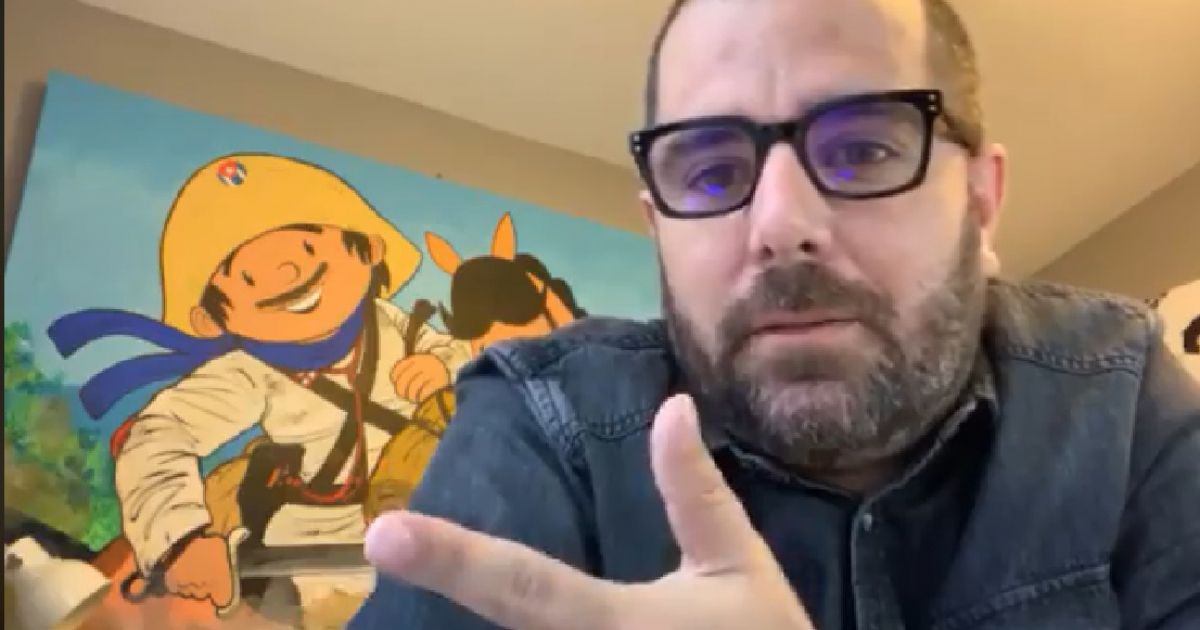
3 | 01/02/2021 – 06:29 (GMT-4)
the Cuban filmmaker, Ian Padró, Recalled in an open letter by the events in the Ministry of Culture (MINCULT), that his father was one of the creators who suffered the censorship of the Government of Cuba.
Ian begins his narration by explaining that in 2003 the ICAIC censored his documentary Out of League, On Cuban baseball. He spent months seeking dialogue with the institution but received silence in response and this “absence of debate” turned into continuous events of intolerance on the part of officials that culminated in verbal and physical aggression towards him, in full lobby of the ICAIC.
“In the midst of this‘ storm ’, my father Joan Padró he asked me not to let myself be paralyzed by these unfortunate facts. It was then that we first talked about something that was very revealing to me: He was also censored and undervalued at some point, just like other greats he admired like Pablo Milanés, Silvio Rodríguez, Pastor Vega o Pedro Luis Ferrer“, Explains the filmmaker on his Facebook profile.
Ian says his father ended that conversation excitedly. “The only real victory I had over the misunderstanding was to keep creating. Trust the Cuban public and the time; they are the ones who will always have the last word,” Juan Padró told him.
In his message Ian also referred to some figures, and institutions within the cultural field in Cuba that were positioned at times in favor of those he categorized as ‘misunderstood’.
“As far as I researched, people like Haydeé Santamaría promoted spaces from The House of the Americas in favor of these “misunderstood.” Faced with this example other institutions risked giving space to these artists who were labeled as “maladapted” or “making fun of the enemy”. That is why there are today the Vampires in Havana, The Blue Unicorn, I hope so, Yolanda, Elpidio Valdés, The brief space where you are not, Portrait of Teresa, 100% Cuban and the cow Pijirigua among many similar examples . Essential references in national culture, the result of these same artists previously labeled as `conflicting ‘,” Ian said.
However, the reaction of House of the Americas, before the events of January 27, He was not in favor of dialogue, nor in support of young protesters, as can be read from a message broadcast by the portal the window where he defined what has happened as “part of a scenario of provocation and destabilization mounted to confuse.”
Silvio Rodríguez, For its part, he preferred to turn a blind eye, indicating that he could not watch the videos showing the violence of state officials against peaceful protesters.
The Cuban singer-songwriter, Pedro Luis Ferrer, on the other hand, publicly expressed his deep rejection to the use of force by MINCULT workers. He noted that the handcuffs (in clear reference to the attitude of Alpidio Alonso) serve to avoid having to discuss what is not appropriate and said he was sad and very concerned about the “spiritual fate” of the Cuban people.
One of the concerns Ian Padró has regarding the events that took place on January 27 in front of the MINCULT headquarters it is in that the pro-government media label the young protesters as “mercenaries”.
“Dir-mercenary is a very serious accusation that can have moral consequences for him, his family and his friends. I know it firsthand,” Padró said.
The violent attitude of Culture officials, with Minister Alpidio Alonso at the front, The Cuban filmmaker interpreted it as a clumsy statement from MINCULT that he does not want more demonstrations in front of his headquarters.
In this sense, he considers it something “congruent with today’s Cuba.” However, he thinks that from this point on to stop and try to label as “employees of the empire” all who were there there is a generalization that can become “dangerous”.
Ian wonders what will happen to all the people who may be innocent of such accusations; and whether there are really possibilities for dialogue in Cuba under indictment without right of reply.
He also uses his open letter to call for reflection, both for Cuban artists and for state institutions.
“I ask Cuban artists to please delve into everything that has happened and to cultural institutions that“ don’t jump on the couch. ”Try to get to know these people who were there, don’t turn their backs on them. “The world is full of” young “Cubans who did not find space in Cuban society and had to look for other horizons. The vast majority are also honest and we will love our country until the end of our days,” said the filmmaker.
“If on the one hand they felt threatened by the police presence and on the other, the institution feels threatened by the phones filming; it is an unequivocal sign that the conditions for a real dialogue were not given. I think in this the two parties have a responsibility to do better, “he said.
The filmmaker considers that “the day this necessary dialogue takes place and we want to show mutual trust; it must be open, with cameras and state media, foreign or independent; without secrecy or mistrust of others.”
Ian Padró’s message is aimed at those who “are still allowed to hear an opinion” and reiterates his rejection of violence perpetrated by state officials against the group of young independent artists and journalists who demonstrated peacefully on January 27 in front of the MINCULT headquarters.